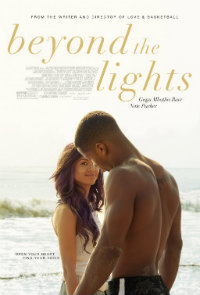Why you wanna fly, Blackbird?: Mbatha-Raw Vibrantly Imbues Prince-Blythewood’s Showbiz Melodrama
 A systematically underrated director, Gina Prince-Bythewood returns with her third feature film, Beyond the Lights, a showbiz romantic melodrama that could have maintained an all-too familiar narrative and tone if it weren’t for the freshness of its perspective and a vibrant performance from lead Gugu Mbatha-Raw. Originally titled Blackbird, so named for the Nina Simone track that figures heavily into the protagonist’s story, Prince-Bythewood’s less spectacular title change due to several other films in development with the same title (including the latest from David Mamet and now a Rooney Mara vehicle as well) lends the film a rather truncated, less artistic aura than it deserves. While not completely absent of a bit of schmaltz and customized fantasy, Prince-Bythewood achieves rare moments of actual, believable chemistry between her leads, and, most importantly, maintains an air of substance in its efforts to remain genuinely heartfelt.
A systematically underrated director, Gina Prince-Bythewood returns with her third feature film, Beyond the Lights, a showbiz romantic melodrama that could have maintained an all-too familiar narrative and tone if it weren’t for the freshness of its perspective and a vibrant performance from lead Gugu Mbatha-Raw. Originally titled Blackbird, so named for the Nina Simone track that figures heavily into the protagonist’s story, Prince-Bythewood’s less spectacular title change due to several other films in development with the same title (including the latest from David Mamet and now a Rooney Mara vehicle as well) lends the film a rather truncated, less artistic aura than it deserves. While not completely absent of a bit of schmaltz and customized fantasy, Prince-Bythewood achieves rare moments of actual, believable chemistry between her leads, and, most importantly, maintains an air of substance in its efforts to remain genuinely heartfelt.
An award winning musical artist on the cusp of becoming a potential phenomenon after her highly anticipated debut album drops, Noni (Gugu Mbatha-Raw) has also turned into a product she is sure she doesn’t want to be. On the eve of winning a major award for a track she’s featured on with her boyfriend Kid Culprit (Colson “MGK” Baker), a studio fostered relationship, she heads back to her hotel room and attempts to jump off the balcony of her Beverly Hills hotel. But her manager mother (Minnie Driver) manages to catch her in time, dispatching the cop, Officer Kaz Nicol (Nate Parker) guarding the room to get her down from the ledge. The officer and the singer share a connection that night, one that has both parties furtively finding ways to chance into the other’s orbit. However, a romance with a troubled pop star seems out of the question for Kaz, whose father (Danny Glover) is trying to foster a political career for his son. Meanwhile, the incident has incited enough media speculation to possibly derail Noni’s career before it even begins, the record label leery of her stability and threatening to delay the album’s release.
Sony reportedly backed out of financing Prince-Bythewood’s feature when the director insisted on casting Gugu Mbatha-Raw, seen as a risk because she was an unknown entity at the time (since filming, the release of Belle might have soothed doubters of her obvious talents as an actor on top of being a great beauty). Her perseverance paid off, considering she re-wrote the part of Noni to include Mbatha-Raw’s British roots. Unfortunately, it’s the type of performance that’s going to be written off and drowned out in a sea of awards courting material, when in fact it’s exactly the type of committed performance worthy of such recognition.
Even if Beyond the Lights sometimes dips into moments of predictability and (forgivable) flights of fancy, it wears its heart on its sleeve and bounces back as quickly as it sometimes missteps. The attraction between its leads is wholly evident, matching the palpably and nuanced growth of Noni’s character from an unhappy puppet to a woman with a voice and agenda of her own.
It nearly goes without saying, but Beyond the Lights deftly navigates the hypersexualiztion and rampant objectification of female musical artists, with Noni coming up in the business as a featured artist on tracks from famed male names (not unlike the beginnings of Nicki Minaj). Sporting a ridiculous mane of purple hair extensions (the removal of which provides the film with one of its most powerfully subtle moments), we clearly see a woman struggling against being portrayed as a commodity she knows she isn’t, and Prince-Bythewood neatly sews up the film’s most potentially overdone details in the set-up, wisely churning it into a portrait of the carelessness and crassness with which the media and consumers handle and judge the talent we throw our money into.
Less flashy but quite charismatic is Nate Parker, who despite working for directors Spike Lee, Denzel Washington, and starring in Prince-Blythewood’s last feature, The Secret Life of Bees (2008) is clearly still an overlooked leading man and untapped resource. He’s given an unnecessary subplot involving an abused wife that could have easily been cut out of the film, but the development of his relationship with the troubled pop star is presented as believable on both ends, even when certain details are overlooked (like his ability to get a passport in time to catch an overseas flight).
As their parents, Danny Glover is relegated to the gruff periphery, but Minnie Driver ends up with a surprisingly moving bit, re-working the monstrous ego of the showbiz parent into an actual character who’s forgotten how to show her love for her daughter—it’s a relationship that examines (perhaps too obviously) the dangers of doing whatever it takes to get where you’re going. Though familiar, Beyond the Lights is more often than not a well-stated, enjoyable film.
★★★/☆☆☆☆☆


